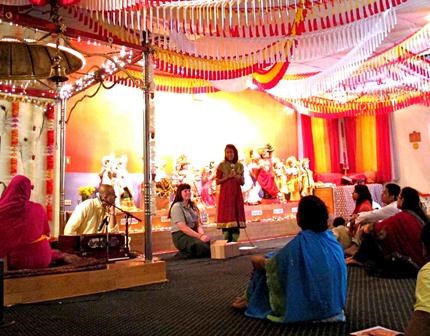
Photo by Mark Woods, used by permission At 6:30 A.M. on a summer Sunday morning, most Jamaica Bay beaches see few visitors besides gulls, terns, and sandpipers searching the waves for an early meal. On July 8, 2012, at Congressman Joseph P. Addabbo/NorthChannel Bridge, part of Gateway National Recreation Area, the birds had company. About twenty Hindu men,women and children sat on blankets spread in the sand, as Hindu priests performed the ritual of Ganga Puja.The ritual involves making ceremonial offerings to Ganga Ma, a Hindu goddess associated with water.The shores of Jamaica Bay have become settings for many similar rituals, not merely by Hindus but by other religions as well. However, this day was different. Hindu priests, known as pandits, invited National Park Service staff to attend. Since 2007 the National Park Service has been actively engaged with the local Indo-Caribbean Hindu community to address concerns surrounding the ritual use of the area. Puja offerings consist of food, flowers, cloth and ceramic or resin statues, among other items. In the past, worshippers often left offerings in the water, which caused problems for humans and wildlife alike. Offerings of cloth can damage boat propellers and smother new shoots of marsh grass in the spring. Marsh grasses are the basis of the salt marsh ecosystem, which acts as a nursery for many recreationally and commercially important fish, crabs and other marine life. The statues offered during the rituals can be a hindrance to barefoot beachgoers. Although food and flowers are biodegradable, they attract rodents and contribute to the overloading of nitrogen in the bay. Nitrogen acts as a fertilizer and causes overgrowths of algae in a process known as eutrophication. When the algal blooms decompose, oxygen is removed from the water, which can cause fish and other marine life to die. The policy of the NPS is to "Leave No Trace." No items can be left on our shores, period. This summer, park rangers were joined by intern Laura Seepaul, a college student at Stonybrook University who is herself a Hindu of Indo-Caribbean descent. The internship was one of 14 positions that were granted as part of the Cultural Resource Diversity Intern Program (CRDIP) in the NPS Washington Support Office (WASO). The program requires a 50/50 investment between the park and WASO. The internship allowed Gateway to deepen the ongoing dialogue with the local Indo-Caribbean Hindu community while creating a young ambassador for park mission and goals. Seepaul connected directly with scientists working in Gateway to enhance her understanding of the ecology of Jamaica Bay. Then, along with park rangers, she visited local mandirs (Hindu temples) in the borough of Queens throughout the summer, speaking before community members, pandits and other leaders during their worship services. The team shared the message of "Leave No Trace" while inviting community members to visit the park and take advantage of its programs and facilities. Mandir leaders and participants responded warmly. Several pandits imparted to their congregations the insight that obeying the "law of the land" (governmental laws and regulations) is obligatory according to Hindu scripture. They suggested alternatives to the placements of pujas that would be inaccordance with their beliefs, such as taking them back and burying them in the devotees' yards. Pandit Vishal Maraj of the Hindu Learning Federation spoke eloquently of the water within the soil being an extension of the waters of Ganga Ma, as all waters on Earth are ultimately connected. After attending the Ganga Puja on July 8, the Park Service outreach team appeared before the USA Pandits Council, an umbrella group representing many of the local mandirs. The team spoke about the message of stewardship and discussed further ways to address the issue. A number of pandits noted that based on previous discussions with the National Park Service they have already urged their followers to remove all items from the beach after rituals and will continue to do so. Simultaneously, presentations among NPS staff and volunteers promoted awareness of the issues surrounding Hindu practices. Presentations allowed employees to ask questions about the Hindu faith and discuss the best ways to address the concerns of non-Hindu visitors to the bridge. Rangers emphasize that there are many types of debris being left on the beach, including typical litter, and that a clean beach is not the responsibility of just one community. They also noted that other religions also use the site for ceremonies and that the same rules must be applied equally to all visitors. Many local residents anecdotally observe that there has been an improvement in the condition of the beach at Addabbo Bridge, but that there is also a ways to go. The next scheduled public cleanup at the bridge will be International Coastal Cleanup Day on Saturday, September 15. Previous beach cleanups have had huge turnouts from the Hindu community, of 100 or more volunteers. The beach will continue to be cleaned on a regular basis by NPS staff and volunteers. Seepaul stated, "There is a lot of misunderstanding between NPS and the Hindu community. I am so grateful to the opportunity to act as an advocate for both parties to foster a mutual understanding, respect, and communication." Gateway plans to sustain the dialogue with the local Hindu community and to spread the message of stewardship of Jamaica Bay via partnerships with New York City college cultural clubs and sociology and ethnography courses. In the end, the well being of Jamaica Bay will depend on the actions of individuals: National Park Service staff, volunteers and community members. |
Last updated: February 26, 2015
